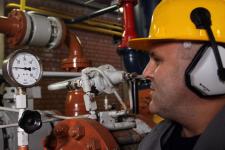 After several days of outages due to the Russia-Ukraine gas dispute, heating in Serbian households was back to normal on Friday thanks to gas imports from Hungary and Germany.
After several days of outages due to the Russia-Ukraine gas dispute, heating in Serbian households was back to normal on Friday thanks to gas imports from Hungary and Germany.
Dusan Bajatovic, general manager of Srbijagas, told Balkan Insight that between four and five tons of natural gas should arrive daily from Hungary and Germany until the dispute between Russia and Ukraine is resolved.
“Although our daily requirements are around 10 million tons, this amount will be quite sufficient for us to provide a minimum but still acceptable temperature in households,” said Bajatovic.
“From the moment the problem is resolved and gas is let through the pipes, our system needs 72 hours to get fully back to normal,” he added.
Serbia’s gas supply was cut off on Tuesday causing problems around the country but more seriously in the province of Vojvodina. Three thermal power plants in Novi Sad, the province’s largest city, shut down, leaving some 80,000 people without heat in subzero temperatures. In the town of Pancevo near Belgrade, trucks carrying firewood were lining up in the city streets.
Citizens of Novi Sad and Beocin were bitter that Serbia was not better prepared.
“Why don’t we have storages like Hungary?” said an elderly female citizen of Novi Sad. “How is it possible that I cannot buy an electric heater?” wonders another.
In a Novi Sad old people’s home on Thursday, local management handed out 130 electrical heaters and helped relocate some of the elderly residents to other homes or families.
“These are very old and sick people who have difficulties relocating. For now we have enough electrical heaters and we grouped people into several larger rooms which are easier to heat,” said director Djordje Petrovic. “If the heating is not normalised, I am afraid that some of these people won’t make it.”
On Friday, all the major thermal power plants in Vojvodina were working normally. Citizens of Novi Sad, Kikinda and Beocin that were contacted by Balkan Insight confirmed that the temperature had stabilized overnight and did not drop below 20 degrees Celsius.
Novi Sad mayor Igor Pavlicic said local authorities would do everything in their power to find alternative solutions in the coming years.
Serbian President Boris Tadic, credited with negotiating the gas import deals, said that while he expects that the conflict between Russia and Ukraine will end soon, Serbia should “learn a lesson” from this experience and work on having adequate gas reserves within the country in case of similar problems.
 Eurasia Press & News
Eurasia Press & News
